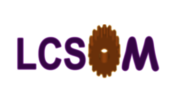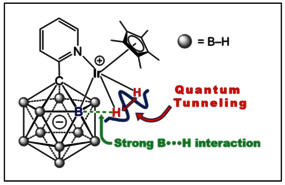Abstract
Quantum mechanical tunneling (QMT) is the mechanism by which a particle can pass through a high potential energy barrier. Although rooted in quantum physics, QMT influences key chemical reactions in a number of ways. Here, we show that a new iridium dihydride complex IrH2 bearing a N,B-bidentate pyridine carboranyl ligand [(C5H4N)CB11H10] undergoes H···H exchange coupling via QMT, as supported by variable temperature NMR studies showing large temperature-dependent exchange coupling constants JH–H (99–162 Hz), nonlinear Arrhenius behavior of the exchanging hydrogens, and the absence of detectable JH–D coupling in the deuterium-enriched complex IrHD. These observations agree with the predicted existence of quantum exchange coupling in metal dihydrides reported by Zilm and Heinekey [J. Am. Chem. Soc. 1990, 112, 3, 920–929]. The observed high relaxation rates T1,min (0.250–0.262 s) support the assignment for IrH2 as being a metal dihydride rather than a nonclassical dihydrogen complex, thus ruling out any major involvement from a classical scalar coupling to the observed large JH–H coupling constants. The reactivity of complex IrH2 against various bases, nucleophiles, and electrophiles was investigated, and X-ray photoelectron spectroscopy as well as computational studies were conducted, all of which support an Ir in the formal + III oxidation state for IrH2.
Reference
Quantum Hydrogen Tunneling in an Iridium Dihydride Complex
Mustapha Hamdaoui, Yann Cornaton, Xingyu Lu, Xiaohuo Shi, Huan Zhang, Jiyong Liu, Bernhard Spingler, Jizeng Sun, Jean-Pierre Djukic, and Simon Duttwyler.
Journal of the American Chemical Society, Published june 25, 2025 – DOI : https://doi.org/10.1021/jacs.4c17482
Contact
Jean-Pierre Djukic, LCSOM, Institut de Chimie de Strasbourg, UMR 7177.



![[Translate to English:]](/websites/_processed_/0/4/csm_signature-unistra_fee3442f1d.png)
![[Translate to English:]](/websites/_processed_/0/e/csm_logo-cnrs_c0f610620b.png)
![[Translate to English:]](/websites/_processed_/9/4/csm_logo-fondation-lehn_24043a5484.png)